For our next RFTV, let’s give Heath Ledger’s “Joker” a round of applause.
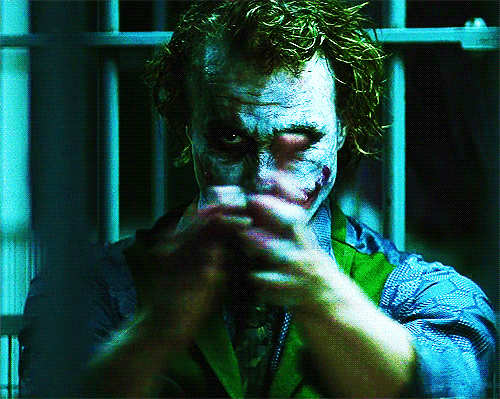
This character was one to root for two fold because the story had legs to it.
And those legs were rooted in a sad reality, even though we see the final product of a fantastical classic narrative – which also has layers: a comic hero (Bale’s Batman, “The Dark Knight”) and his nemesis played to perfection by Mr. Ledger. The thing is, within the parameters of the story, I’m not thinking “gee, I sure hope he kills batman” – mostly because of the two facts that we know: that’s never how it ends and that it’d be inconsistent with the Joker’s motives. He may not be a man with a plan, but he “needs” him to stay alive to enjoy the running Tom and Jerry style gag of seeing Batman writhe about not killing the Joker when he wants to. Besides, we don’t like Bale any less just because his nemesis is terrifying, hilarious, and somehow still charismatic (even with that lumbering gait of an Initech worker who’s just lost his job and blown up the building upon departure).
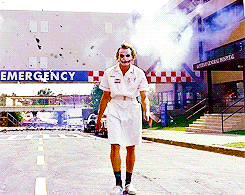
We like Ledger’s rendition because he’s so committed to the character that you get a bit lost in the performance. It’s the reason we watch movies at all. And while the uninspired, more forgettable films seem to senesce, scenes like Heath’s abscond into our subconscious mind and rise for blogs like mine, time and again.
There’s the “makes ya think” quality of him – that reminds me of that quote about heaven and hell being a line that runs through the hearts of men. He and Batman aren’t the sole soul-tortured torch bearers. Any of us carry the gravitational capacity to tumble into madness, as he says while whooping maniacally and suspended into the night air from the side of a building.
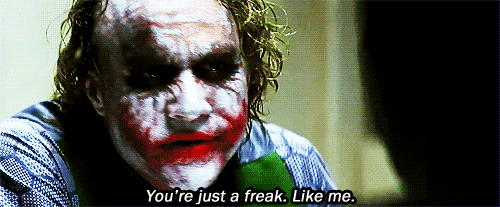
And the fact that he so ardently seems to believe in his own logic (which – like a Nietzsche novel – begins to increasingly and frighteningly make more sense the more you take it in), is also magnetic. I remember seeing a science article on how psychopaths are often alluring because of the appearance of confidence. The Joker’s no exception – even as a fictional fixture.
Then, as with Breaking Bad or any other otherwise morose show, there are the necessary moments of comic relief to keep you from hating the character, leaving the movie, going home, and scheduling a sky diving sesh sans a parachute. Like his reaction when the hospital bombs don’t detonate straight away. Or when he delivers a subtle “Hiiii…” in that infamous Lynchian voice through a façade of melting clown makeup and oily hair while donning a nurse’s outfit. And the fun-ception of it goes a layer deeper into our brains that love irony – and thus also love the fact that his seemingly anodyne greeting belies the fact that he just killed a nurse to acquire said hospital camouflage.
Still, my fave may be the moment when Maggie G enters and he gently pushes his greasy hair back with graceful fingers… that belong to the same hand gripping the murder weapon… which he’d use to kill her with, remorselessly.
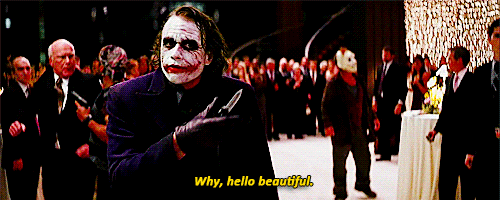
That irony carries over to the aforementioned reality element of the film, too.
Many of us know as we watch – if only at our subconscious level – that this was the second to the last film that Ledger did. Given the fact that death is automatically actor canonization and that he particularly brought his method-best to the role, it’s inevitable. To my shame, there was admittedly a sort of morbid excitement that accompanied going to watch this in theaters. I’m not proud of that raw human emotional response my culture has cultivated in me – because I know he’s a person like you or me and it’s awful that he died – whether it was because of the role, his own demons, or some cinematic synthesis of the two that would make for fine biopic Hollywood fodder. But since that Hollywood pantheon with all its performance deities is something I was raised to believe in exalting or ridiculing (by the example of everyone around me focusing on it constantly) , it’s hard to not have that first-reaction impulse be an inward iconization or objectification of seemingly inhuman idols. Things. Not flesh and blood. But, deep down, we know that’s not right.
I suppose that’s why I always liked the reality element of the “stars” (not reality stars) and valued interviews over the actual work they’d done. Sure, they still improv act for a talk show – but without a script, those little nuances and traces remain of the last role – the ones they just can’t seem to shake when they do a press junket. Like how Heath seemed to still be trying to shake the symptoms of his nasally, lip-licking Joker like an obstinate flu, in this last interview:
And that was likely exacerbated exponentially by the physical symptoms and identity thievery of the drugs on which he’d become dependent. Maybe he’d struggled with them long before, or perhaps he’d taken it up during filming – to sleep at night after delving into such a dark role, day after day.
Thus, the fact that the story-character Joker was partially faulted for Heath’s real-life downward spiral, only amplified this intrinsic response of mine. For me, the comparison of reality to the movie is that I wish he could have enacted the same superpower of self-control that Batman uses to get The Joker mental help (since he can’t kill him) to get himself help. But addiction – like the comic cyclical rival narrative itself – can never be maimed or stopped; only kept at bay, one day at a time. One fight at a time.
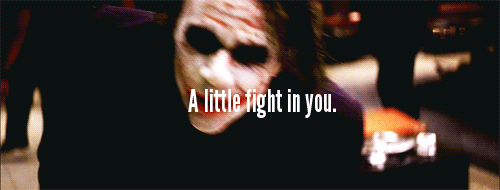
Sadly, the The Joker of this no-joking-matter disease won the not so little fight.
It reminds me of when Phillip Seymour Hoffman passed – and I was asked by a nice, well-adjusted person how I thought someone so rich couldn’t just buy constant psychological help to dissuade their impulses to abuse drugs or alcohol. And I get where they’re coming from. It’s really hard for someone who sleeps without an incubus hovering over them each night – that some people do. And that it doesn’t want our wallets. It wants its claws in our sanity. To slowly drain us of our blood and make us do the same to those we love as it’s doing to us.
And it often wins.
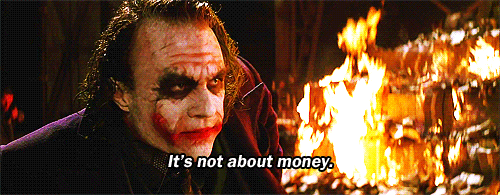
For others less educated or unable to conceive of the condition of addiction, Heath’s character’s akin to watching the visual echo of that sexy, psychopathic ghost we all might have residing within us – and the crime scene forensics outlining the undoing of a talented man. All played out on silver screen.
That Heath was so brilliant as an actor and that the Joker became so iconic…
… just made the echo that much louder after his passing.
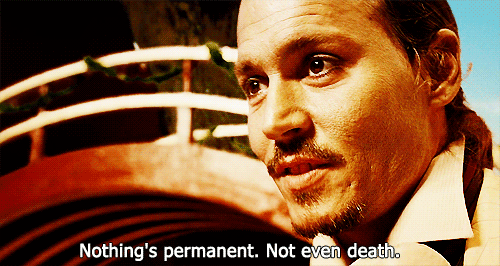
(From Imaginarium, his last film – Depp played an alter ego of Ledger’s character along with Jude Law and Colin Farrell to finish it.)